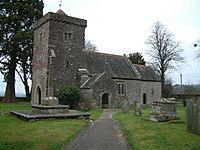St Andrew's Church, Tredunnock facts for kids
Quick facts for kids Church of St Andrew, Tredunnock |
|
|---|---|
| Church of St Andrew | |

"a very attractive and well preserved medieval church"
|
|
| Lua error in Module:Location_map at line 420: attempt to index field 'wikibase' (a nil value). | |
| Location | Tredunnock, Monmouthshire |
| Country | Wales |
| Denomination | Church in Wales |
| History | |
| Status | Parish church |
| Founded | C12th-C13th century |
| Architecture | |
| Functional status | Active |
| Heritage designation | Grade II* |
| Designated | 18 November 1980 |
| Architectural type | Church |
| Style | Perpendicular |
| Administration | |
| Parish | Tredunnoc |
| Deanery | Raglan/Usk |
| Archdeaconry | Monmouth |
| Diocese | Monmouth |
The Church of St Andrew is a historic church located in Tredunnock, Monmouthshire, Wales. It has been a place of worship for a very long time, possibly since the 12th or 13th century. Today, it is still an active church where people gather. It is also a special building, known as a Grade II* listed building, which means it's protected because of its important history and architecture.
Contents
History of the Church
The Church of St Andrew might have been built as early as the 12th century. This idea comes from two narrow, pointed windows, called lancet windows, found in the chancel (the part of the church near the altar). These windows look like they could be from the Norman period.
However, the first official mention of the church in records is from the middle of the 13th century. Most of the church you see today was built much later, around the 15th or 16th centuries. This includes the entrance area, called the porch. The font (a basin for baptisms) and the very top of the church tower were added in the 17th century.
Modern Changes and Famous Visitors
The church had a big makeover in the early 1900s. An architect named Arthur Grove led this project. There's a special stone tablet inside the church, made by a famous artist named Eric Gill, which mentions this restoration. It is dated 1910.
A writer and artist from Monmouthshire, Fred Hando, once wrote about the churchyard. He noted that the grave of Eleanor Isabella Gill was there. She was the only child of Sir John Franklin, a famous explorer who traveled to the Arctic.
Architecture and Design
The Church of St Andrew is built from a type of rock called Old Red Sandstone. Its design follows the Perpendicular style, which was popular in England during the late Middle Ages.
Inside the Church
Inside, you can find a very old Roman grave-slab. This is a flat stone that was once used to mark a grave. An expert on old buildings, John Newman, said it has "splendidly lettered and well-preserved" writing. This stone remembers a soldier named Julius Julianus. He was part of the Second Augustan Legion, a Roman army group based at Isca Augusta, which is now Caerleon.
The porch of the church also has an early stone tablet made by the artist Eric Gill. Fred Hando, in his book Journeys in Gwent (published in 1951), wrote about the church. He said that for 500 years, the people of Tredunnock had worshipped in their "lovely brown church."
The Church of St Andrew is officially recognized as a Grade II* listed building. This means it's considered a very important historical building. Its official listing describes it as "a very attractive and well preserved medieval church."

